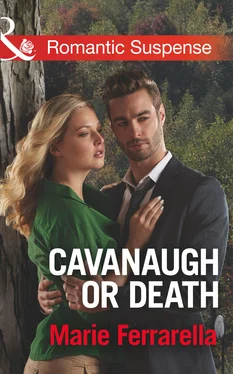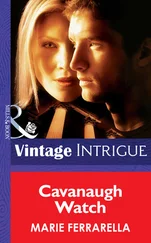“Hey, you okay?” Malloy asked, catching her by the shoulder to take a closer look at her face. “You look like someone rode you hard and put you away wet,” he observed seriously.
Moira pulled away from him, although her expression never changed. “Ah, you’re as golden-tongued as always, big brother. I can see why all the ladies find you so terribly charming. You obviously have to beat them off with a stick.”
“Seriously, Moira, you all right?” Malloy asked. “The back of your head is partially damp. Are you trying for some sort of a new style, or did they turn off your electricity while you were in the middle of blow-drying your hair?”
This time Moira frowned. She hated when he started being too observant when it came to her. “You’re the detective, you tell me.”
Malloy arched a bemused eyebrow. “Since when has anyone ever been able to tell you anything?” he called after her as Moira walked into the elevator.
“I always listen to someone who makes sense,” she replied innocently, then added, “I guess that leaves you out, doesn’t it?” just as the elevator doors closed, taking her away from his view.
Only when the doors were securely closed did Moira reach behind her head and touch the back of her hair—and frowned.
Damn, she thought, annoyance nibbling away at her. Malloy was right. For some reason, in her hurry to get to the precinct on time, she had somehow neglected to dry the length of hair right in the middle.
She briefly thought about going into the bathroom and making unorthodox use of the hand-dryer, but shrugged away the idea.
With luck, no one would look in her direction until that section of her hair air-dried itself.
Right now she had something more important on her mind, Moira reminded herself as she reached her floor. She wanted to tell her lieutenant about the suspicious scene she’d stumbled across at the cemetery.
Much as she hated being restrained, she knew that she needed his blessings before she could begin to investigate.
Chapter 2
Before getting down to the business at hand, Moira paused in the break room long enough to get a cup of what passed for coffee in the precinct. It was universally agreed that the quality was poor, but at least the coffee was hot. In addition, it was also extremely bitter. The combination definitely revved up her engine and put her in a fast-forward mode.
Fortified and sufficiently jolted into a keenly alert state, Moira placed what was left of the black swill on her desk and marched herself into her superior’s small, glass-enclosed office.
Legend had it that Lieutenant Jacob Carver had once been a passably decent-looking man. Years on the force had etched themselves into his jowl-lined face, giving him what appeared to be a permanent hangdog frown, accented by scowling, bushy eyebrows that came close to meeting over the bridge of his patrician nose; all of which looked more than mildly intimidating to most newly minted detectives assigned to his squad.
Although Moira didn’t welcome interaction with the less-than-jovial man, she wasn’t intimidated by him, either. Growing up in a family of seven, most of which had excelled in rowdiness before they had reached the age of three, had given her a spine of steel and a sense of self that served Moira quite well in her chosen field. She was polite, and deferred to higher authority when she had to, but she was never intimidated.
The door to Carver’s office was closed. He wasn’t—and never had been—an open-door kind of superior. If a subordinate wanted an audience with the man, they had to follow a number of rules—the first of which was knocking before entering. The second of which was to be invited in before entering.
Moira paused to knock and then, not waiting for an invitation, she opened the lieutenant’s door. “Got a minute, Lieutenant?”
“Got sixty of them in every hour,” he responded without looking up from the report he was currently writing.
Since Carver hadn’t said no, Moira took that as an invitation by default and proceeded to enter the man’s inner sanctum.
“I’d like to run something past you,” she told the man, closing the door behind her.
Ordinarily she would have just left it open, but she knew that Carver was incredibly secretive about every conversation he had with anyone, especially any of his people. It didn’t matter about what. He liked maintaining an air of secrecy.
Carver ignored her for a moment, undoubtedly with the hope that she would simply go away. But everyone in the precinct had come to realize that the name Cavanaugh was synonymous with stubbornness and, though it irritated him, he’d learned that the one assigned to his division was no exception.
So when Moira remained inside the room, he sighed, put down his pen—a holdout of a bygone era, Carver still liked to use pen and paper rather than keyboard and mouse—and looked up.
“And what is it that you want to run past me, Cavanaugh?” he asked wearily.
Moira had long since decided not to take offense at the way Carver uttered her surname. There were Cavanaughs in every department of the precinct and, while most of the police personnel were on friendly terms with them, there were others who were not. The resentful ones believed that the Cavanaugh name instantly bought those who wore it a certain amount of leeway and gave them access to shortcuts that other officers and detectives were not privy to.
Carver was on the fence when it came to buying into that philosophy.
She could, however, detect the resentment in her lieutenant’s voice whenever he said her last name in a tone that sounded as if he was partially taunting her. Such as now.
“When I was out for my run this morning—” Moira started.
As she began to answer his question, Carver reached for a powdered-sugar-dusted cruller, one of two that he always picked up every morning on his way to the precinct. He paused for a moment, giving her a dark look as if she’d thrown the line in to mock him and the pear-like shape his body had taken on over the years.
“Oh, yeah, I forgot. You’re big on health, aren’t you?”
The look in Carver’s brown eyes challenged her as he bit into his cruller with a vengeance. Powdered sugar rained down on the page he’d been writing on, but he seemed not to notice.
“It wakes me up,” Moira replied matter-of-factly. She wasn’t about to get sucked into a debate about the pros and cons of what she did in her private life. “Anyway, as I passed by St. Joseph’s Cemetery entrance—”
Carver stopped eating. “You run past the cemetery?” he asked incredulously. “Maybe you should transfer to Homicide if you like dead people so much.”
Moira had no idea how the man managed to make the leap from what she was telling him by way of background information to what he’d just said, but again, she detected the antagonistic note in his voice and didn’t rise to the bait.
“I like being on this squad just fine, sir,” she replied. “Anyway, these two figures—”
“Figures?” he questioned skeptically. “You mean, like, zombies?” It was clear that he was mocking her and not about to take anything she said seriously unless she forced him to acknowledge it in that light.
“No. Like, robbers, sir,” Moira corrected matter-of-factly, doing her best to get to her point and not be sidetracked by his interjections. “They were dressed in black and wearing ski masks. One of them ran right into me and just kept going—”
Carver dusted off his hands and reached for the crumpled napkin in the bag that contained the crullers. “I’m guessing there’s a point to this ghost story, Detective.”
“There is, sir. I went into the cemetery to find out why the two figures were fleeing—”
Читать дальше












